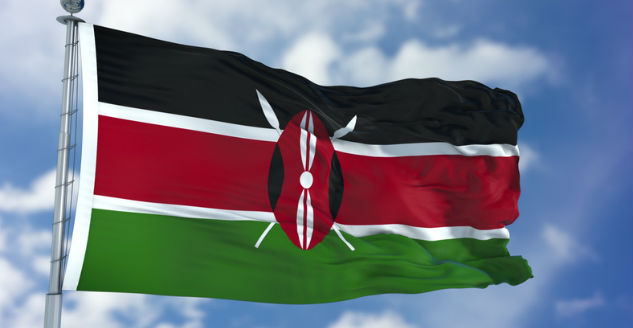DAY 14 – LOCAL COMMUNITY / TWO LOCAL MEDICAL CLINICS / HOSPITAL
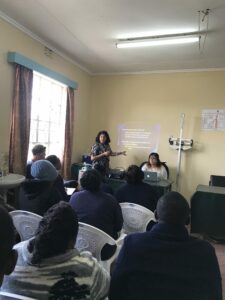 Our last day of the trip! We can hardly believe our time in Kenya is coming to an end. Today we went to three different locations and mostly to medical clinics. Between the teams, we were able to work with the local nurses, doctors and medical staff. As with most of the professionals that we have worked with, the demands on the medical profession is high as there are a lot of services needed with limited resources.
Our last day of the trip! We can hardly believe our time in Kenya is coming to an end. Today we went to three different locations and mostly to medical clinics. Between the teams, we were able to work with the local nurses, doctors and medical staff. As with most of the professionals that we have worked with, the demands on the medical profession is high as there are a lot of services needed with limited resources.
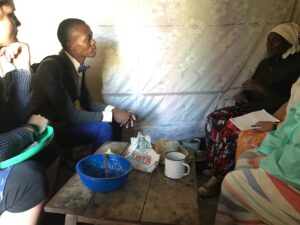 One team spent half of the day working in a community near the Bamboo Medical Clinic. Going to the various houses, the team was able to learn more about how they live and have conversations with residents. There were so many stories of resilience about how they live and face daily challenges. One group was able to gather eight women to discuss how they handle stress and to teach them techniques of breathing and “tapping” to aide in their daily stress regulation.
One team spent half of the day working in a community near the Bamboo Medical Clinic. Going to the various houses, the team was able to learn more about how they live and have conversations with residents. There were so many stories of resilience about how they live and face daily challenges. One group was able to gather eight women to discuss how they handle stress and to teach them techniques of breathing and “tapping” to aide in their daily stress regulation.
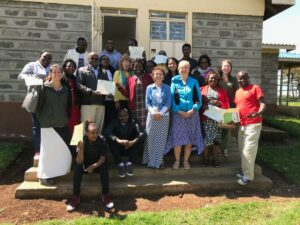 The second team visited the Lari Medical Clinic, a level four hospital. They presented to 23 health care workers from different counties who came to learn more about compassion fatigue and how to help their stress levels throughout their shifts.
The second team visited the Lari Medical Clinic, a level four hospital. They presented to 23 health care workers from different counties who came to learn more about compassion fatigue and how to help their stress levels throughout their shifts.
The third team went to the Giabe Hospital and Dr. Keyes presented to a group of nurses and administrators on compassion fatigue, grief and loss. The facilitation of groups was focused around those themes and some of the nurses were able to process the difficulties in handling situations in which babies die and they have to communicate the news to the family. We are grateful for another successful day and as we close our work, we are excited to relax and debrief for the next couple of days!
DAY 13 – TRAINING LOCAL POLICE / LOCAL COMMUNITY WORK / TRAINING INTO ABBA’S ARMS STAFF
Today we split into three teams to cover three distinct areas. One team traveled to the local Naivasha police station to train the local police on topics of hostage negotiation, communication skills and compassion fatigue. A team stayed at Into Abba’s Arms to continue the training of the staff that works to keep the facility and the care of the children going. The third team traveled back to the Kihoto community to work with the residents.
At the police station, Dr. Keyes and George presented on Hostage Negotiation and facilitated a communication and strategy exercise to a group of about 20 various officers, detectives and administration. In the afternoon, they worked on communication skills and processing the various stressors of the job. One shared that they work 30 days in a row, with only a week off in between. Their job schedule and demands are significant and make it challenging to have any down time or leisure time. They shared that alcoholism, suicides and divorce rates are all problems that they experience.
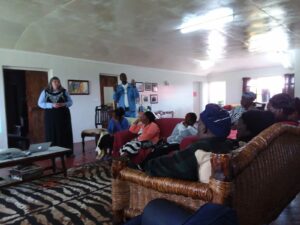 The team that worked with the Into Abba’s Arms staff continued their training with “Dealing with Disruptive Children” and additional information on compassion fatigue. The group noticed that the staff were able to utilize the various skills and the group discussions helped to process some of their experiences they have here at the children’s home.
The team that worked with the Into Abba’s Arms staff continued their training with “Dealing with Disruptive Children” and additional information on compassion fatigue. The group noticed that the staff were able to utilize the various skills and the group discussions helped to process some of their experiences they have here at the children’s home.
Reflection by Jessica Torres-Pryor, PhD
Our team was excited to go into the Kihoto community for the day. The focus of our group was to meet Kenyans in their neighborhood and learn about their culture.
The bus dropped us off outside of the village. We were immediately greeted by curious children between the ages of two to thirteen. They all wanted to give us high fives and hold our hands. We brought out tennis balls, frisbees, and paper planes to share with the growing crowd.
We went door to door with our interpreters, asking if we could speak to family members about Kenyan culture. Most of the people we spoke to were mothers. They spoke openly about the struggles to find work and food, education goals for their children, and daily life in Kihoto.
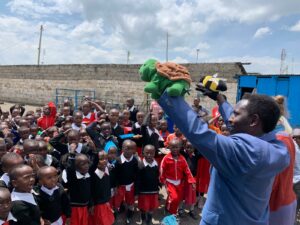
The final stop of the day was a visit to a primary school. We taught the students popular American children’s songs and presented a motivational speech about self-esteem and confidence. The children were enthusiastic and eager to participate. We could see God’s love and joy in the children!
DAY 12 – WORKING WITH PRISON INMATES
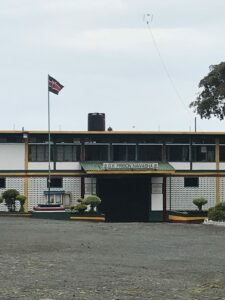 Our entire team returned to the Naivasha prison to work with over 150 inmates in the men’s maximum security prison. The prison has about two thousand men that are serving sentences of 35 years to life, some with a death sentence. The prison system in Kenya is drastically different than that of the US, so we didn’t really know what to expect going in.
Our entire team returned to the Naivasha prison to work with over 150 inmates in the men’s maximum security prison. The prison has about two thousand men that are serving sentences of 35 years to life, some with a death sentence. The prison system in Kenya is drastically different than that of the US, so we didn’t really know what to expect going in.
Dr. Keyes presented to a group of about 150 inmates on Compassion Stress Management and we broke out in groups of about 20 to interact with them about the stressors of prison and how they coped (successfully or unsuccessfully) with stress in prison. Throughout the groups, you could see how challenging their daily life was and how they struggled to hold onto anything positive at times.
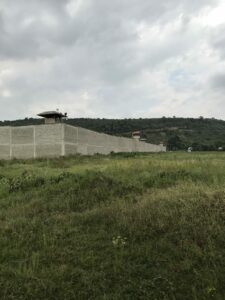 Following the group work, we continued presenting on substance abuse and its role in inhibiting healthy coping skills and how it may interfere with re-entry back into society. It may even be a reason that they end up back in prison. We held a panel of a select group of our students and the inmates were given an opportunity to ask questions about the topic of substance abuse and the psychological and behavioral impacts of alcohol. We were also able to learn about some of the support system they have in prison, similar to that of Alcoholics Anonymous or Narcotics Anonymous in the US.
Following the group work, we continued presenting on substance abuse and its role in inhibiting healthy coping skills and how it may interfere with re-entry back into society. It may even be a reason that they end up back in prison. We held a panel of a select group of our students and the inmates were given an opportunity to ask questions about the topic of substance abuse and the psychological and behavioral impacts of alcohol. We were also able to learn about some of the support system they have in prison, similar to that of Alcoholics Anonymous or Narcotics Anonymous in the US.
In our regular evening group meeting, we spent a significant amount of time processing the stories, thoughts and feelings that we encountered throughout the day. As professionals, we shared our insights on how the community life in prison operates in both constructive and destructive ways. Processing feelings of despair, hope, grief and even desperation were really important for us as a group to understand. One of the team members shared how they were able to see the prison inmate as a brother and child of God, which helped them to converse with them throughout the group exercises. Another successful day as a team and we are grateful for all that we learned through the challenges today!
DAY 11 – LOCAL COMMUNITY WORK / PRISON STAFF TRAININGS
Our second full week began with our group going in a couple of directions. One group went to work with the staff at the Naivasha Prison, one of the local county prisons that has both a maximum and minimum security prison within its grounds. The other group went to a local community called ‘Kihoto’ to work door to door with the families there.
The team that worked with the prison staff presented on compassion stress management and spent time teaching them coping skills for stress. The prison staff live very stressful lives, with demanding work and responsibility for many tasks and duties that cause an increase in stress. They had commented how challenging it was to work almost every day and in difficult conditions. Dr. Keyes and counseling student (and professional Drug and Alcohol Counselor) George Forsythe presented on Hostage Negotiation and Substance Abuse to the group and the team continued to facilitate conversations about how the staff cope with the everyday stress.
The community experience was door to door in a local community. The purpose of the community work is to start conversations with the locals to learn more about how they live, their culture and share the purpose of our work, if relevant. We found that this often leads to a lot of fruitful conversations and meaningful interactions. We went in small groups and spent the morning being guests in their small 10×10 homes. We learned that many of them came from far away in search of work. There was a local flower shop that was a source of employment for many, but many of the families struggled with maintaining a regular income. One young man in particular was finishing his schooling and was working toward becoming a teacher so that he can invest in the future generation of kids. He expressed so much joy and hope in what his education could bring to those around him. It was truly inspiring to see how they could be resilient in a place that doesn’t lend itself to prosperity.
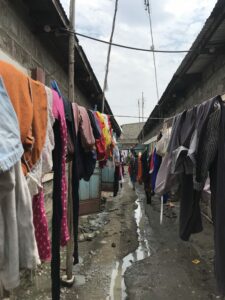
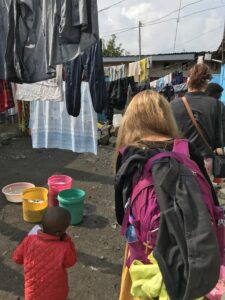
DAY 10 – REST DAY
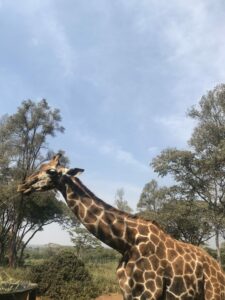
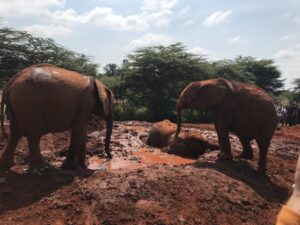 How happy we are to have a day of rest! After ten days of work, we enjoyed a well deserved day of full relaxation and fun activities. (Although with our team, we have always found fun around us.) We started the day off at the The Giraffe Centre, where we were able to get close and personal (and for some, a little too personal) while feeding the giraffes. We saw 12 giraffes wandering around the conservatory which are part of a breeding project. Our next stop was an elephant and rhino rescue foundation. We got an opportunity to watch 14 baby elephants, ranging from 14 months to a couple of years, play and feed while we learned how the program identified orphaned elephants and rescued them from certain death and starvation. Their work culminates in a 5-year reintroduction process that introduces the orphan elephant into a new herd. Some of us even got to touch and play with them! And as the saying goes, an elephant never forgets – so we left a bit of the DMU team here!
How happy we are to have a day of rest! After ten days of work, we enjoyed a well deserved day of full relaxation and fun activities. (Although with our team, we have always found fun around us.) We started the day off at the The Giraffe Centre, where we were able to get close and personal (and for some, a little too personal) while feeding the giraffes. We saw 12 giraffes wandering around the conservatory which are part of a breeding project. Our next stop was an elephant and rhino rescue foundation. We got an opportunity to watch 14 baby elephants, ranging from 14 months to a couple of years, play and feed while we learned how the program identified orphaned elephants and rescued them from certain death and starvation. Their work culminates in a 5-year reintroduction process that introduces the orphan elephant into a new herd. Some of us even got to touch and play with them! And as the saying goes, an elephant never forgets – so we left a bit of the DMU team here!
 After the elephants, we stopped at the local handmade bead shop, Kazuri. The shop provides and sustains employment opportunities for disadvantaged members of Kenyan society, and makes beautiful ceramics and beads. We were able to see how the beads are made and formed into earrings, necklaces and bracelets.
After the elephants, we stopped at the local handmade bead shop, Kazuri. The shop provides and sustains employment opportunities for disadvantaged members of Kenyan society, and makes beautiful ceramics and beads. We were able to see how the beads are made and formed into earrings, necklaces and bracelets.
While we were driving along, we happened to see a man in the middle of the road lying there. We stopped since it was potentially dangerous and discovered that he was actually having a seizure. Our two nurses who were with us ended up helping him through and getting him help and transportation to the local hospital. The man told us that he has epilepsy and had run out of medication and thus was grateful for the assistance! Even on our day off, we are still at work – but happy serving when needed.
We ended the day with wonderful food in a local upscale mall in Nairobi and an afternoon full of relaxation. Some of the team went and saw “The Lion King” – how appropriate for us in traversing Kenya! Others went shopping or found a local massage and we all appreciated the time off.
DAY 9 – SUNDAY WITH PASTOR MOSES
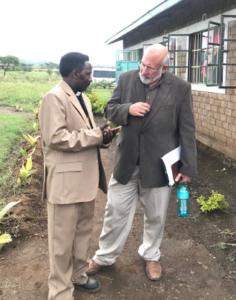
Our Sunday celebration took place in a community a few hours north of where we are staying, the home of Pastor Moses who has been one of the fearless leaders and interpreters this week. The last time Dr. Keyes was in Kenya, he made a promise to Pastor Moses that when the IDP (Internally Displaced Persons) camp was closed in the nearby forest he would visit the church of the community. We traveled over many bumpy roads, many without names, through a lot of extensive farm land (including coffee!). The church community was very warm and inviting and Pastor Moses led the three-hour service in praise of God’s goodness in bringing the visitors and those who regularly worship together. Pastor Moses asked Dr. Keyes to preach on a passage from Matthew, which was an honor!
Following the service (which included a lot of singing and dancing!), we met survivors from the IDP camp. Dr. Keyes met a woman named Veronica, whom he had interacted with the many years prior when he was doing trauma work in the camps. What a joyful celebration and fulfilling promise.
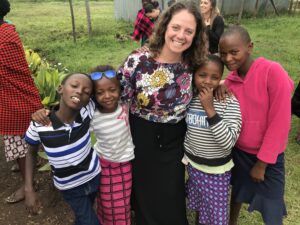
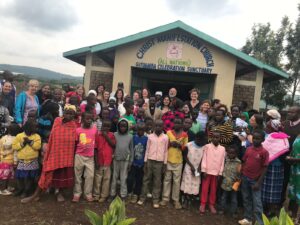
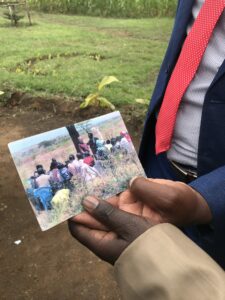
DAY 8 – MEN’S CONFERENCE / PRIMARY SCHOOL / HIGH SCHOOL
Today our team split into two groups, one went to local community schools and the other stayed at Into Abba’s Arms to host the Men’s Conference.
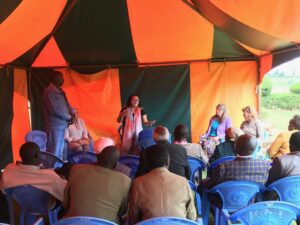 For the Men’s Conference we were looking forward to facilitating conversation with the men, since their role in the family system is significant. In the morning, Dr. Keyes presented on Domestic Violence and the various forms of abuse, including physical, psychological and emotional forms of abuse to a group of 30 men (and some women!). The afternoon the teams presented on Marital Conflict and Fatherhood and facilitated groups to discuss the themes of the afternoon.
For the Men’s Conference we were looking forward to facilitating conversation with the men, since their role in the family system is significant. In the morning, Dr. Keyes presented on Domestic Violence and the various forms of abuse, including physical, psychological and emotional forms of abuse to a group of 30 men (and some women!). The afternoon the teams presented on Marital Conflict and Fatherhood and facilitated groups to discuss the themes of the afternoon.
Reflection by Jessica Torres-Pryor, Ph.D., and Catherine Day, M.S. in Counseling student
Our team enthusiastically made plans for our presentation on self-esteem and conflict resolution. We showed up at an all girls high school and were promptly rerouted to Good Shepherd primary school due to construction issues. This was our time to practice holy flexibility! We made the best of it as we waited along the highway, by the sheep on a rope, for our bus to arrive. It was an unexpected blessing.
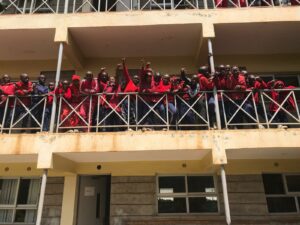
Upon our arrival at the Catholic primary school, the students were on their tea break. We were greeted with loud laughter and joyful dancing. The team then moved to the classroom to present. It was a tight fit with 50+ youth in a room only meant to hold 30 students.
The students’ eagerness was contagious as they learned the self-esteem concepts. They were quick to share examples that highlighted their strengths, personal goals in life, and values.
The adventure continued at a co-ed high school. We joined another team and presented to 300+ students. The power of God’s message of self-worth appeared to touch many hearts.
Our trauma team’s commitment to the mission was a joy to witness. The students were encouraged to embrace the concept of self-esteem with songs and chants. We believe the children left the seminar filled with God’s grace!
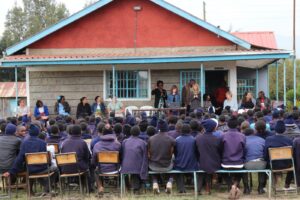
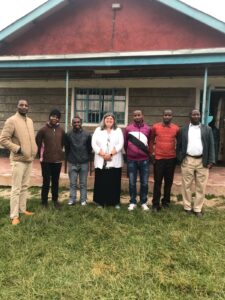
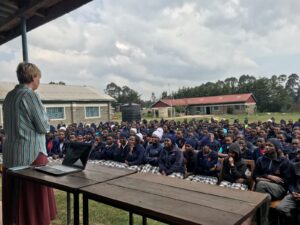
Reflection by Detti Bella, Community Professional
It was great to see our team’s preparation and talents come together for our mission. We spent the morning presenting to teachers about “Education through the Lens of Trauma.” It was amazing to see their response to the information and how they will utilize it with the children. Next, we presented to 50 student on self esteem and “wowed” them with our great acting and singing skills. The kids learned to be proud of who they are. We introduced them to a new super hero “Captain Thought Changer” who reminded them “if you change the way you think you can change the way you feel.” We experienced traditional Kenyan food, and enjoyed fellowship with the teachers after the presentations.
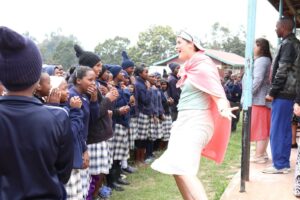 After lunch we visited a local boarding high school, where we all joined together as a big team and presented to 300 students on self esteem. Once again Captain Thought Changer made an appearance in her new teenage form, during our skits and songs. The “juice” was sky high! We concluded with reminding the students of their identity in Christ by singing a song by a local artist together. We reminded them who they are and whose they are, and reminded them that “what is in their minds is what is in their hearts,” as one student said. Afterward we all enjoyed the company of the students, while Dr. Keyes presented to the teachers about how trauma affects education.
After lunch we visited a local boarding high school, where we all joined together as a big team and presented to 300 students on self esteem. Once again Captain Thought Changer made an appearance in her new teenage form, during our skits and songs. The “juice” was sky high! We concluded with reminding the students of their identity in Christ by singing a song by a local artist together. We reminded them who they are and whose they are, and reminded them that “what is in their minds is what is in their hearts,” as one student said. Afterward we all enjoyed the company of the students, while Dr. Keyes presented to the teachers about how trauma affects education.
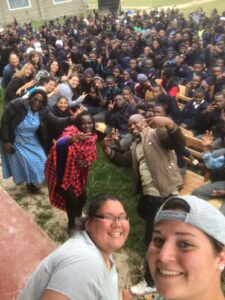
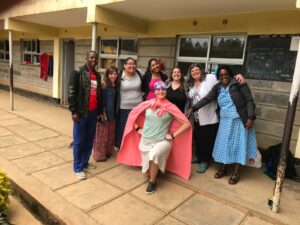
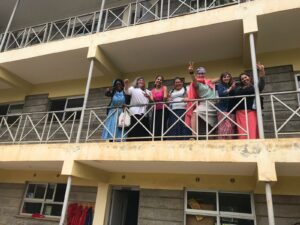
DAY 6 AND 7 – LOCAL PASTOR’S CONFERENCE
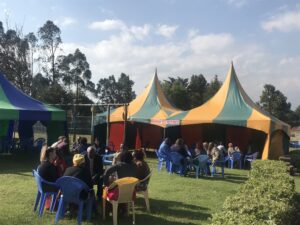 Thursday and Friday brought a two-day conference geared for the local pastors. Over the past couple of days, we have learned how important the role of the pastor is in the community and how much they serve the families in need. In their example as Christians and leaders, they provide counseling and guidance for the many difficult situations that affect their community. For example, Pastor Moses spent many years in the IDP (Internally Displaced People) camps bringing the hope of Christ to those who truly lived in difficult circumstances.
Thursday and Friday brought a two-day conference geared for the local pastors. Over the past couple of days, we have learned how important the role of the pastor is in the community and how much they serve the families in need. In their example as Christians and leaders, they provide counseling and guidance for the many difficult situations that affect their community. For example, Pastor Moses spent many years in the IDP (Internally Displaced People) camps bringing the hope of Christ to those who truly lived in difficult circumstances.
In the morning, Dr. Keyes presented on Treating Traumatized Families by helping them identify family needs and what is working in their community and what is not working in the community. He emphasized helping to repair the damage in relationships, especially in the family system, since that healing can significantly help to bring change all around them. The DMU team helped to facilitate conversations, which were very powerful, in processing the effects of trauma on the family system and what the pastor’s were seeing in their communities.
The afternoon was focused on teaching basic counseling skills, something that our students are well versed in and were excited to demonstrate. The groups practiced active listening skills, attending behaviors and skills like summarizing and paraphrasing. One of the pastor’s expressed gratitude for learning counseling skills, since the emphasis is mostly on education of theology.
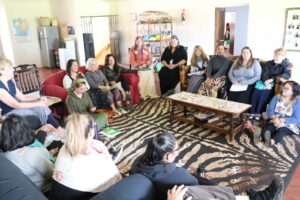
Reflection by Colleen, M.S. in Counseling student
We began the day tackling the pressing topic of Grief and Loss. Our team first met to process some of our own personal experiences, and discovered in the process that team building and cohesion are the natural fruits of openness, vulnerability, and sharing in a safe environment. This experience stayed with us as we joined about 30 pastors and youth leaders for Dr. Keyes’ presentation. We had pastors and youth leaders in our small group, eager to share their gratitude for what they had learned. Things quickly went deeper as our group processed their observations and experiences, including that “loss” can encompass so much, and that psychological and emotional losses are sometimes minimized. Rejection by family members can be a pain so great, and yet isolating, as one youth leader shared.
We found commonality between our cultures in that we acknowledge that we are born relational, and when our pain is dismissed it makes us feel unloved, regardless of the source of the pain. On the other hand, when there is openness, trust, and sharing, each person feels heard and understood. To feel heard and understood is to feel loved, which we accept as a universal human longing.
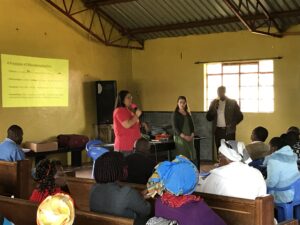 Viewing a household or a marriage as a team, tied in well with this morning’s lesson in team building through trust and vulnerability, and also segued well into the afternoon’s topic on Marital Conflict. A group of students presented marital researcher John Gottman’s four stages of marital conflict and adapted the stories and case studies to relevant cultural themes. The presentation included some role playing, which provided much-needed comic relief, and set the stage for the afternoon’s small groups. Hearts and minds opened by God’s grace were deeply convicted and ready to take the day’s lessons home and into their communities.
Viewing a household or a marriage as a team, tied in well with this morning’s lesson in team building through trust and vulnerability, and also segued well into the afternoon’s topic on Marital Conflict. A group of students presented marital researcher John Gottman’s four stages of marital conflict and adapted the stories and case studies to relevant cultural themes. The presentation included some role playing, which provided much-needed comic relief, and set the stage for the afternoon’s small groups. Hearts and minds opened by God’s grace were deeply convicted and ready to take the day’s lessons home and into their communities.
Lord, You spoke of rich soil in today’s Gospel. Bless the seeds we have sown, and the sincere desire for goodness that these people have for their homes and their country. By Your love and grace, bring a full harvest to these beautiful people.
DAY 5 – LOCAL CHILDREN’S HOME STAFF AND INTO ABBA’S ARMS STAFF
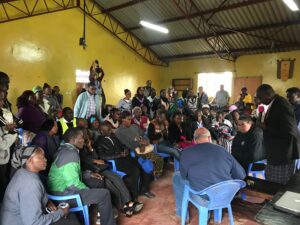 We welcomed over 50 staff members from Local Children’s Homes and Into Abba’s Arms to continue our presentations and training. In the introduction, one of the members shared their gratitude for the day saying that ‘knowledge is power’ and that what they were learning would help to assist in their needs in the work that they do.
We welcomed over 50 staff members from Local Children’s Homes and Into Abba’s Arms to continue our presentations and training. In the introduction, one of the members shared their gratitude for the day saying that ‘knowledge is power’ and that what they were learning would help to assist in their needs in the work that they do.
Compassion fatigue training and education was a large part of our day, starting with a group reflection on how we are recognizing our own fatigue and working on caring for our own selves before we are able to serve others throughout the day. This is often very challenging! Throughout the day, we worked with various techniques for compassion fatigue, including a visualization exercise, deep breathing and a stress-reducing tapping technique. It was encouraging to see what a difference learning these techniques had on the group as a whole, and for us personally as a team!
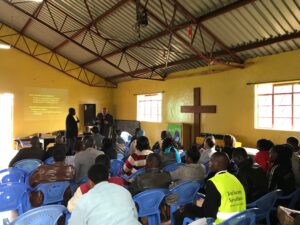
A topic that was very helpful for those that are working directly with children was ‘Dealing with Disruptive Behavior.’ We explored the reasons why children behave in disruptive ways and the environmental factors that influence behavior, in order to help conceptualize the appropriate way to discipline. It was interesting to explore the differences between natural consequences of behavior with corporal punishment, along with the cultural differences and similarities between the United States and Kenya.
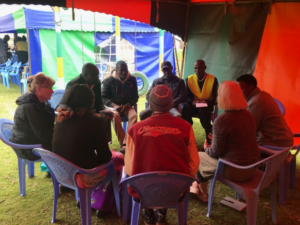 Many of our team members were commenting on how universal many of the problems and conflicts that we’ve shared in both of our experiences. A hot topic seems to be the growing access to technology and the social influences on behavior! The day ended with a lot of group discussion and sharing on what was learned from the day’s presentations.
Many of our team members were commenting on how universal many of the problems and conflicts that we’ve shared in both of our experiences. A hot topic seems to be the growing access to technology and the social influences on behavior! The day ended with a lot of group discussion and sharing on what was learned from the day’s presentations.
DAY 4 – SOCIAL WORKERS CONFERENCE
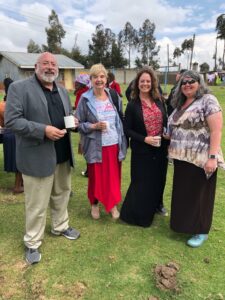
Today we had the privilege of hosting a group of local social workers for a day of training. We spent a lot of time going through the impact of trauma on children and adolescents — as many of these workers spend a lot of their time working with traumatized children on all levels. Many children have been afflicted by violence, and the unaddressed trauma can create very difficult situations for their safety and for those that work with them. Training is critical to be able to educate on the various factors of trauma and what can be done to work more effectively with the children. We taught the group a stone technique that helps to gather a lot of information in a short amount of time. After modeling the technique, our groups helped to facilitate with the participants, with many of them sharing their own family’s stories. One of the participants at the end of the conference shared that he felt more equipped to take the information back and place it into practice. As a team, we reflected on the power of telling your story and how the process of sharing can lead to something powerful.
DAY 3 – LOCAL WOMEN’S CONFERENCE
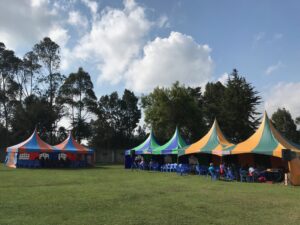 Our feet hit the ground on Monday as we hosted local community women for a day of training and group work, focusing on the effects of domestic violence, sexual trauma, natural consequences of parenting and marital conflict. A lot to cover in a very short amount of time! Dr. Benjamin Keyes presented to the group on the topic of domestic violence, sharing the various forms that abuse takes and how to recognize and prevent instances of abuse from happening. Domestic violence is pervasive in the Kenyan culture and many of the attendees shared personal experiences as well as observations that they had regarding family dynamics and the tension at times between the cultural roles and differences between women and men. Following the presentation, the team led process group sessions to hear more of the stories and reactions to the topic presented.
Our feet hit the ground on Monday as we hosted local community women for a day of training and group work, focusing on the effects of domestic violence, sexual trauma, natural consequences of parenting and marital conflict. A lot to cover in a very short amount of time! Dr. Benjamin Keyes presented to the group on the topic of domestic violence, sharing the various forms that abuse takes and how to recognize and prevent instances of abuse from happening. Domestic violence is pervasive in the Kenyan culture and many of the attendees shared personal experiences as well as observations that they had regarding family dynamics and the tension at times between the cultural roles and differences between women and men. Following the presentation, the team led process group sessions to hear more of the stories and reactions to the topic presented.
DAY 2 – THE ARRIVAL: INTO ABBA’S ARMS
Reflection by Angie, M.S. in Counseling student
After many long hours of travel, we finally arrived at Into Abba’s Arms (IAA). At this point, I expected myself to be overwhelmed with exhaustion, but the notion quickly went away at the sight of bright and welcoming children. As the bus began to pull into the orphanage compound, we were immediately greeted with smiling faces and excited waves. A few minutes were spent greeting the children before we switched gears into settling into our new temporary home.
As team members, we divided ourselves into different shared bedrooms (with the exception of our one male colleague who gets his own room- yes, we are all slightly jealous). Personally I get the opportunity to experience eight of my female colleagues as roommates in adult bunk beds. Though initially apprehensive about this set up, I have come to learn that our bedroom serves as a microcosm for the divinely inspired honesty, cohesiveness, and fluidity of our entire team.
Perhaps the most impactful experience of our second day was getting to meet the children, here at the orphanage. I can’t articulate just what I was expecting after all of our training in preparation for this trip, but the authentic warmth and eager sociability that I did encounter was not it. Knowing the statistics of violence and child abuse here in Africa, I was in awe and admiration of the children’s resiliency, deep understanding of the importance of taking care of one another, and radiant joy. The children took to us immediately and began playing with frisbees and toys that some team members gifted to them. It did not take very long for them to address us as “auntie” and “uncle.” They took myself and a few others on a brief tour around the compound, which included the chapel, dining hall, and guard dog pen — they warned that the dogs would eat us if we weren’t careful! After dinner, we joined the children in Saturday night worship where they led us in singing and praises.
Throughout our second day, I found myself contemplating the old adage “Don’t waste food because there are starving children in Africa.” Yes, there is poverty here; I am not minimizing their experiences. The love at IAA, however, both for and from the children, is truly unmatched. After just one day with the children, I want to change the challenge. Instead, may we be motivated to remind ourselves “Don’t waste love because there are starving children. Everywhere.”
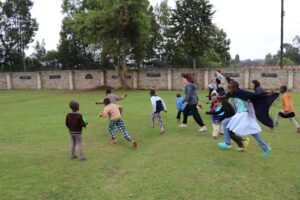
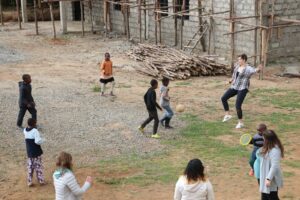
DAY 1 – TRAINING AND TRAVEL
The Center for Trauma & Resiliency Studies’ second immersion experience, this year in Kenya, began at the Divine Mercy University (DMU) campus with 23 members of the team gathering for two days of training, education and team bonding. The team is made up of a diverse group of faculty, professionals, and current DMU M.S. in Counseling students from across the country — all with an interest to work in trauma and gain field experience by working with various populations.
During the time in Kenya, we will be hosted by the organization Into Abba’s Arms, a charity foundation dedicated to helping orphans in Kenya. As their mission shares, they strive to provide their children with critical necessities including housing, food, and clothing – all in a loving home environment with a nurturing caretaker. They have been able, over the years, to establish an outreach center from which they coordinate spiritual and education seminars, medical clinics, and food and water distribution to the neighboring community. We are grateful for the opportunity to spend time with them and the children throughout the couple of weeks as we stay with them in our temporary ‘home.’
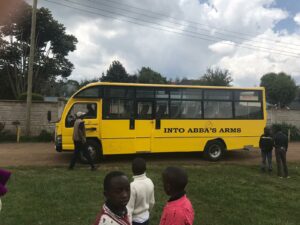
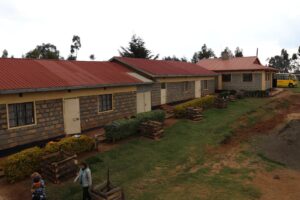
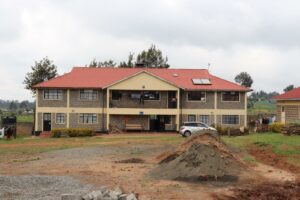
We will be conducting seminars and trainings for a variety of populations and groups throughout the two-week period while in Kenya. Local community men and women, church community leaders, social service workers, those in caregiving positions with various organizations and more will be receiving training on compassion fatigue, child and adolescent trauma, treating sexual trauma, grief and loss, human trafficking and more.

